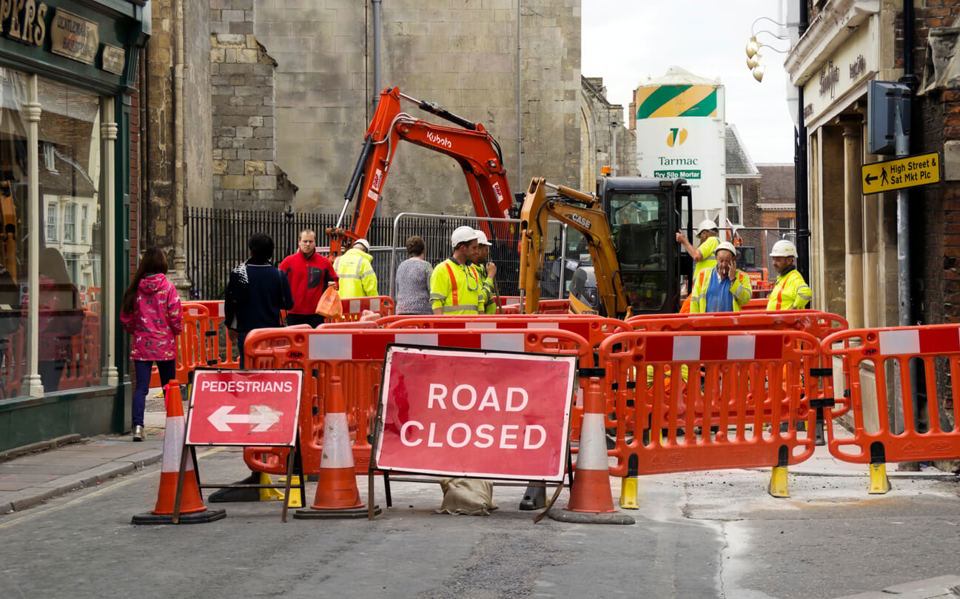The Government has announced its ‘biggest ever’ road resurfacing programme to improve local roads plagued by potholes.
The Department for Transport (DfT) has allocated £8.3 billion of funds, which it says have been redirected from the cancelled phase 2 part of HS2, enough to resurface more than 5,000 miles of road across the country over the next 11 years.
However, the Asphalt Industry Alliance (AIA) has previously reported that, while half (51%) of local roads are in good structural condition, the remainder - more than 100,000 miles - could continue to deteriorate to the point of needing to be rebuilt within the next 15 years, without appropriate maintenance measures.
Across England, local highway authorities will receive £150 million this financial year, followed by a further £150m for 2024/2025, with the rest of the funding allocated through to 2034.
There is £3.3bn for local authorities in the North West, North East and Yorkshire and Humber; and a further £2.2bn for local authorities in the West Midlands and East Midlands.
Finally, £2.8bn has been awarded to local authorities in the East of England, South East, South West and, for the first time in eight years, London.
"The lack of urgency to implement plans is disappointing," Michelle Gardner, Logistics UK
Each local authority can use their share of the £8.3bn to identify what local roads are in most need of repair and deliver immediate improvements for communities and residents.
Prime minister Rishi Sunak said: “Well-maintained road surfaces could save drivers up to £440 each in expensive vehicle repairs, helping motorists keep more of the cash in their pocket.
“This unprecedented £8.3bn investment will pave the road for better and safer journeys for millions of people across the country and put an end to the blight of nuisance potholes.”
The funding comes on top of £5.5bn already committed by the Government up until 2024/25, which includes the £200m announced by the Chancellor at the Budget in March.
Transport secretary Mark Harper added: “Most people travel by road and potholes can cause misery for motorists, from expensive vehicle repairs to bumpy, slow, and dangerous journeys.
“Our £8.3bn boost to repair roads across the country shows that we’re on the side of drivers.
“Today’s biggest ever funding uplift for local road improvements is a victory for all road users, who will enjoy smoother, faster and safer trips - as we use redirected HS2 funding to make the right long-term decisions for a brighter future.”
RAC head of policy, Simon Williams, says that the poor condition of local roads is drivers’ biggest bugbear.
“The fact the Government has found a significant additional pot of revenue should give councils the certainty of funding they need to plan proper long-term road maintenance, something we have been calling for many years,” he added.
“We hope local authorities will use the money in the most effective way possible by resurfacing the very worst roads, keeping those in reasonable condition in better states for longer through surface dressing, and filling potholes as permanently as possible wherever necessary.
“This should in time go a considerable way to bringing our roads back to a fit-for-purpose state and saving drivers hundreds of pounds in the process from not having to fork out for frustrating repairs to their vehicles.”
To increase transparency and ensure the £8.3bn leads to an increase in the number of roads being resurfaced, local authorities will be required to publish information on their websites on a regular basis explaining how they are spending the funding in their area.

Edmund King, AA president, said: “Perilous roads blighted by potholes are the number one concern for drivers and a major issue for bikers, cyclists and pedestrians.”
So far this year, the AA has attended more than 450,000 pothole-related breakdowns.
King explained: “The damage caused can be a huge financial burden for drivers but is also a major safety risk for those on two wheels.
“The £8.3bn plan can make a considerable difference in bringing our roads back to the standards which road users expect, especially if councils use the cash efficiently to resurface our streets. As well as safer roads, eliminating potholes gives confidence to people wanting to cycle and instils pride of place within local communities.”
This year’s Annual Local Authority Road Maintenance (ALARM) survey, published in March by the AIA, reported worsening carriageway conditions, with local authority highway teams in England and Wales requiring more than £14bn to fix the backlog of road repairs.
Almost one fifth (18%) of the network (almost 37,000 miles) is already assessed as having less than five years’ structural life remaining, with the average frequency of resurfacing for all classes of roads now stands at once every 116 years.
Rick Green, chair of the AIA, said: “This additional funding is good news for local authorities in England and is much needed to help them to tackle the backlog of repairs.
“We have long been calling for surety of funding over the long-term and the fact that the DfT has committed to this money being available over the next 11 years should allow highways teams to implement more efficient works to improve local road conditions and enhance the resilience of the network once they have details of their allocation.”
He added: “This long-term investment will also help give the asphalt supply chain confidence to further invest in plant upgrades, materials innovation and technical advancements to support the development and delivery of lower carbon roads, in line with the Government’s net zero ambitions.”
Fleet operators "severely impacted"
Logistics UK says that commercial fleet operators have been "severely impacted" by the decline in the state of highways in recent years.
Its members currently face significant bills for repairs caused by pothole damage which, on average, currently stands at £575.74 for an HGV and £246.87 for a van, while the impact of taking vehicles off the roads for repair is interrupting the supply chain.
“Given the size of the roads repair backlog and that logistics businesses pay £5bn a year in fuel duty and vehicle excise duty, the lack of urgency to implement plans is disappointing," said Michelle Gardner, deputy policy director at Logistics UK.
"Our sector wants to see this new funding spent more quickly, to get our roads back into a good state, and more funding allocated after that.
"We want to see sustainable, long-term funding for local authorities to address the pothole problem – rather than being dependent on political cycles.
"As well as funding transport maintenance, our members also need to see a long-term transport investment plan for logistics that resolves the capacity constraints that will result from not building HS2 beyond Birmingham.”





















Login to comment
Comments
No comments have been made yet.